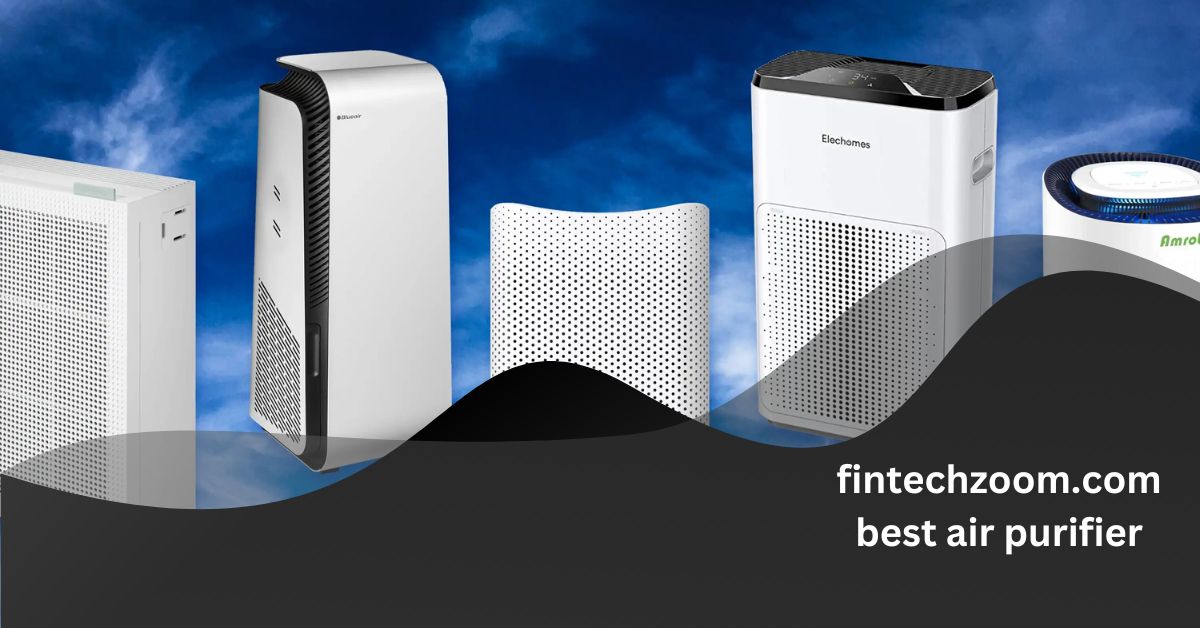In today’s world, air quality has become a growing concern. With increasing pollution levels and health awareness, many people are looking for ways to improve the air they breathe at home. Air purifiers have emerged as a popular solution, but with so many options available, how do you choose the best one? This article dives into the world of air purifiers, inspired by insights from fintechzoom.com, to help you make an informed decision.
What Is an Air Purifier?
An air purifier is a device designed to filter and clean the air in a specific space, removing pollutants, allergens, and odors. They are particularly beneficial for individuals with respiratory conditions, allergies, or those living in polluted urban areas.
How Do Air Purifiers Work?
Air purifiers use a combination of filters and technologies to clean the air. Here are the main components:
- Filters: Most air purifiers feature multiple filters, including:
- HEPA filters: These capture 99.97% of particles as small as 0.3 microns, including dust, pollen, and pet dander.
- Activated carbon filters: These absorb odors and volatile organic compounds (VOCs), making the air smell fresher.
- Fan: The fan circulates air through the filters, pulling in contaminated air and releasing cleaned air back into the room.
- UV Light: Some purifiers use UV light to kill bacteria and viruses, adding an extra layer of protection.
Why You Need an Air Purifier
Air purifiers can significantly enhance indoor air quality by:
- Reducing Allergens: They help minimize allergens like dust, pollen, and pet hair, making them essential for allergy sufferers.
- Eliminating Odors: They can effectively remove unpleasant smells from cooking, pets, and smoke.
- Improving Respiratory Health: Cleaner air can reduce the risk of respiratory issues and improve overall health.
Key Features to Consider When Choosing an Air Purifier
Selecting the right air purifier can be daunting. Here are some critical features to consider:
1. Room Size
Air purifiers are rated for specific room sizes. It’s essential to choose a model that matches your room dimensions. A unit that’s too small won’t be effective, while one that’s too large may be unnecessarily expensive.
2. Filter Type and Replacement Costs
Understanding the type of filters used and their replacement costs is crucial. HEPA filters are effective but can be costly to replace. Some models offer washable filters, which can save money in the long run.
3. Noise Levels
If you plan to use the air purifier in a bedroom or quiet space, noise levels matter. Look for units with a quiet mode or those specifically designed for low noise output.
4. Energy Efficiency
An energy-efficient model will save you money on electricity bills. Look for air purifiers with the Energy Star label.
5. Additional Features
Many modern air purifiers come with added features, such as:
- Smart Technology: Some models can be controlled via smartphone apps, allowing you to monitor air quality remotely.
- Air Quality Sensors: These detect air quality in real time and adjust the purification settings accordingly.
- Multiple Fan Speeds: This provides flexibility depending on the level of pollution.
The Benefits of Using FintechZoom’s Recommended Air Purifiers
According to fintechzoom.com, some air purifiers stand out from the rest. Here’s a closer look at a few top recommendations and what makes them unique.
1. Coway AP-1512HH Mighty Air Purifier
This highly rated model is known for its compact design and powerful filtration system. It includes a four-stage filtration process, including a HEPA filter and an activated carbon filter, making it ideal for various indoor spaces.
2. Dyson Pure Cool TP01
The Dyson model offers both purification and cooling features, making it a versatile choice for warmer climates. Its sleek design and smart technology integration allow for convenient use and monitoring.
3. Honeywell HPA300
This model is known for its large coverage area, making it perfect for bigger rooms. With a true HEPA filter and easy-to-use controls, it’s a reliable choice for families looking to improve air quality.
Tips for Maintaining Your Air Purifier
To ensure your air purifier functions optimally, follow these maintenance tips:
- Regular Filter Replacement: Stick to the manufacturer’s recommendations for filter changes.
- Keep the Unit Clean: Wipe down the exterior regularly to prevent dust buildup.
- Check for Blockages: Ensure that air intakes and exhausts are clear for proper airflow.
Conclusion:
Choosing the best air purifier is an essential step towards ensuring cleaner, healthier air in your home. By considering factors like room size, filter type, and additional features, you can find the right model for your needs. With the recommendations from fintechzoom.com, you can make an informed choice and breathe easier knowing that your air quality is in good hands.
FAQs:
1. What is the best air purifier for allergies?
The best air purifier for allergies typically features a HEPA filter, which effectively captures allergens like dust, pollen, and pet dander. Models like the Coway AP-1512HH are highly recommended.
2. How often should I replace the filters?
Filter replacement frequency varies by model and usage, but generally, HEPA filters should be replaced every 6-12 months, while activated carbon filters may need replacing every 3-6 months.
3. Are air purifiers noisy?
Noise levels differ by model. Look for air purifiers with a “quiet mode” or low decibel ratings for bedroom use.
4. Can I use an air purifier in multiple rooms?
Some air purifiers are portable and can be moved between rooms, but for larger areas, it’s best to choose a model rated for that specific size.
5. Do air purifiers eliminate odors?
Yes, many air purifiers with activated carbon filters are effective at removing odors from pets, cooking, and smoke.
6. What is the average lifespan of an air purifier?
Most air purifiers last between 5 to 10 years, depending on usage and maintenance.
7. Can air purifiers reduce the spread of viruses?
Air purifiers with HEPA filters and UV technology can help reduce airborne viruses and bacteria, contributing to a healthier indoor environment.
8. Is it safe to run an air purifier all day?
Yes, air purifiers are designed for continuous operation, making them safe to run 24/7 for optimal air quality.
9. Are there energy-efficient air purifiers?
Many brands offer energy-efficient models, often labeled with Energy Star certifications, which consume less power while maintaining performance.
10. Do I need an air purifier if I have good ventilation?
While good ventilation helps, air purifiers provide an extra layer of protection by filtering out pollutants that may still enter your home.



